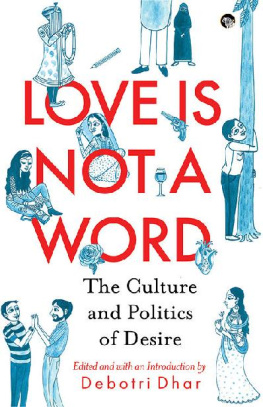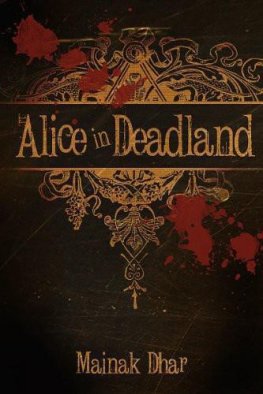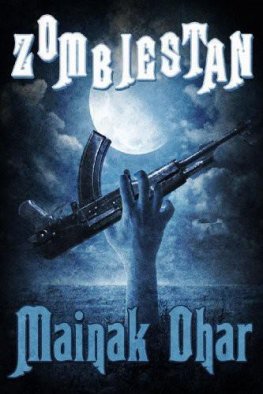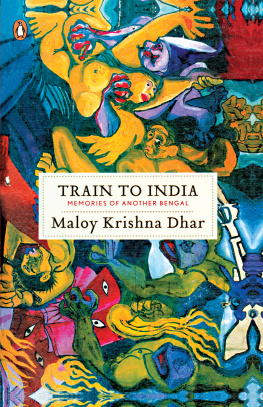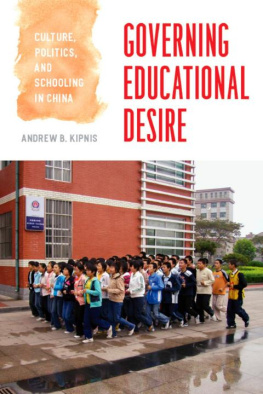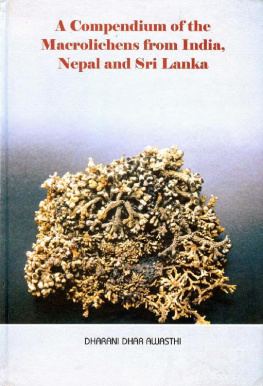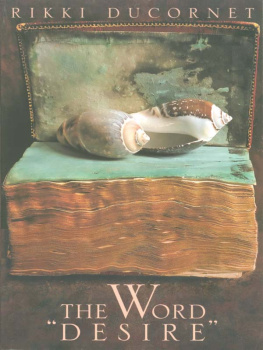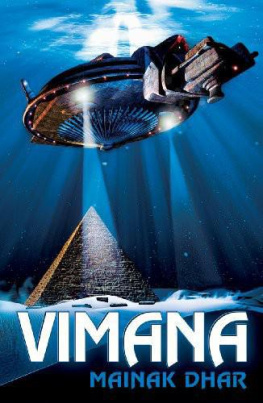Debotri Dhar - Love Is Not a Word: The Culture and Politics of Desire
Here you can read online Debotri Dhar - Love Is Not a Word: The Culture and Politics of Desire full text of the book (entire story) in english for free. Download pdf and epub, get meaning, cover and reviews about this ebook. year: 2020, publisher: Speaking Tiger Books, genre: Romance novel. Description of the work, (preface) as well as reviews are available. Best literature library LitArk.com created for fans of good reading and offers a wide selection of genres:
Romance novel
Science fiction
Adventure
Detective
Science
History
Home and family
Prose
Art
Politics
Computer
Non-fiction
Religion
Business
Children
Humor
Choose a favorite category and find really read worthwhile books. Enjoy immersion in the world of imagination, feel the emotions of the characters or learn something new for yourself, make an fascinating discovery.
- Book:Love Is Not a Word: The Culture and Politics of Desire
- Author:
- Publisher:Speaking Tiger Books
- Genre:
- Year:2020
- Rating:4 / 5
- Favourites:Add to favourites
- Your mark:
- 80
- 1
- 2
- 3
- 4
- 5
Love Is Not a Word: The Culture and Politics of Desire: summary, description and annotation
We offer to read an annotation, description, summary or preface (depends on what the author of the book "Love Is Not a Word: The Culture and Politics of Desire" wrote himself). If you haven't found the necessary information about the book — write in the comments, we will try to find it.
Debotri Dhar: author's other books
Who wrote Love Is Not a Word: The Culture and Politics of Desire? Find out the surname, the name of the author of the book and a list of all author's works by series.
Love Is Not a Word: The Culture and Politics of Desire — read online for free the complete book (whole text) full work
Below is the text of the book, divided by pages. System saving the place of the last page read, allows you to conveniently read the book "Love Is Not a Word: The Culture and Politics of Desire" online for free, without having to search again every time where you left off. Put a bookmark, and you can go to the page where you finished reading at any time.
Font size:
Interval:
Bookmark:
Debotri Dhar teaches Womens Studies at the University of Michigan. Her books, scholarly as well as fiction, include Postcards from Oxford: Stories of Women and Travel (London), the novel The Courtesans of Karim Street (New Delhi), The Best Asian Short Stories 2018 (Singapore; selected and edited with introduction), Education and Gender (Bloomsbury: New York, London; edited with introduction), and others. Her shorter fiction has been published in literary magazines and anthologies worldwide. Debotri is the founder of the Hummingbird Global Writers Circle, a transnational travelling literary initiative to foster a love of books, cultural exchange, and global understanding.
Debotri earned a Bachelors degree in Economics from Delhi University, a Masters in Womens Studies, with distinction, from Oxford University and her PhD in Womens and Gender Studies from Rutgers University.

Contents
Debotri Dhar
Malashri Lal
Makarand R. Paranjape
Alka Pande
Christina Dhanaraj
Nilanjan Mukhopadhyay
Mehr Afshan Farooqi
Zafar Anjum
Rakhshanda Jalil
Debotri Dhar
Parvati Sharma
Sumana Roy
Didier Coste
Introduction
DEBOTRI DHAR
The idea for this book first occurred to me when I was a graduate student at Oxford University; and then again, a couple of years and another continent later, while teaching at Rutgers University in the United States. Why, I wondered, while watching the leaves change colour in the fall, were there very few serious yet engaging books on love, its many moods and multiple meanings? Just when I was considering taking a writing break to head to Kasauli, that misty, much-loved haunt in the Himalayas, life took me to teach at a liberal arts college in Ohio for a year. The cottages, rolling hills, and winding country roads in that part of America were not entirely unlike those in Kasauli in India, the horseand-buggies of the Amish community adding an extra touch of Midwestern whimsy. But a full research and teaching schedule did mean that this book of essayssomewhat unusual, in the delightfully measured words of an editor remained a dream. It was only after I started teaching at the University of Michigan in Ann Arbor that various pieces of the love book, as family and friends had fondly started referring to it, began to fall in place. A long gestation indeed
This is a collection of twelve essays on love by scholars, critics, essayists, and journalists. Love: at once art, insight, event, encounter, aporia, utopia, ethic. In literature, culture, history, metaphysics, politics, and their interstices, ideas about love abound. Love has been a central mood and metaphor in fiction, poetry, and drama around the world: Shakespeares Romeo and Juliet, for instance, or Antony and Cleopatra. Or Gone with the Wind, Margaret Mitchells 1936 American novel that went on to be captured exquisitely on celluloid: Vivian Leigh and Clark Gable, loves lessons, loves loss, no less than a saga and no more than a light shrugFrankly, my dear, I dont give a damn. And how could we forget the many visions and revisions of love in Sanskrit classics such as Sudrakas play Mrcchakatika (The Little Clay Cart); and the fifth century poet Kalidasas lyric poem Meghduta (The Cloud Messenger) which narrates how, in the wet, quivering season of asadha, a yaksa exiled in Ramagiri entreats a passing rain-cloud to carry his message of love to his beloved left behind in the ancient Indian city of Alaka?
In the first essay in this collection, Swayamvara, Arranged Marriage, and Desi Romance, Malashri Lal offers some fascinating perspectives on Indian love, mapping both continuity and change, possibility and paradox. Drawing from sources as diverse as epics like the Ramayana and the Mahabharata that continue to hold sway over the collective imagination, works of literature including those by women writers from the Indian diaspora in the United States, and Bollywood films, Lal asks if from ancient to modern times, the principle of a womans choice in love and marriage has ever been entirely absent any more than it has ever been fully realized. Rather than monolithically posit the powerlessness of Indian women against the imperial-colonial assumption of freedom of her Western counterpart, Lals essay thus draws our attention to the many diversities that constitute Indias spectrum international designer wedding ensembles for the rich and child marriages among the very poor, the stark portrayals of love in a consumerist global media versus the textured layers of everyday lifeto underscore the complexity, the in-betweenness, the being and becoming of love.
We turn, then, to divine love and its myriad depictions across literatures and cultures. The 1977 Australian classic, Thornbirds by Colleen McCullough, for instance, a complex tale of a man torn between his love of a woman and his love of Christ. Returning to the Indian context, Lals discussion of love and womens choice in Indian epics, her brief invocation of Gandhi, and her critique of the imperial gaze overlap in intriguing ways with the second essay in the collection by Makarand Paranjape. Paranjapes essay on immortal love focuses on the lover-God Krishna and his consort Radha, a milkmaid elevated to the status of the erotic and holy beloved of the Supreme Godhead.
According to Paranjape, the extraordinary story of Radha must be read not just for itself, but in the larger context of Indian history, art, culture, and metaphysics. The male-dominated Hindu theology of Vaishnavism before Radha suffered from a Goddess-lack and this, Paranjape argues, is why the Vaishnava revival and even female-dominant Shaktism needed the love-Goddess Radha. Hardly mentioned in classical sources and scriptures such as the Bhagavata Purana but later assuming prominence in Jayadevs Gitagovinda, Radhas importance as Krishnas chosen paramour, even spouse, steadily rises, her persona being further moulded by poets like Chandidas, Vidyapati, and Surdas. Paranjape traces Radhas metamorphosis under the puritanical gaze of colonial modernity, and how her passionate dalliance with Krishna became an embarrassment to the agenda of political and social reform espoused by the proponents of Hindu respectability. Hence this essays ultimate philosophical and provocative speculation: what would Radha say to Mahatma Gandhi, if she were suddenly to meet him as he was trying to rid himself of all sexual passions for the sake of society and polity?
The theme of the cultural erasure of sexuality through a resurgent respectability politics is carried forward in the next essay by Alka Pande, which re-engages with the Kamasutra through the eyes of the famed nayika and nagarvadhu of Pataliputra, Amrapali. Told in the voice of this powerful courtesan who, in desiring as well as being desired, chooses her men and lives her life independently, not subjugating herself to any man, the essay gives us a postcolonial glimpse into an exquisitely imagined past, and even an unlikely foreshadowing of feminist futures.
In A Lovers Discourse, the French literary theorist and philosopher Roland Barthes also spoke of romantic loves artful un-anchoring, the language of lovers that punctures quotidian narratives tying us to social worlds, dulled times and spaces, to permit a gentle haemorrhage that makes anything possible. Drawing from the work of those such as Barthes, Sandoval examined power, social and psychic emancipation, a hermeneutic of love-as-consciousness.
So what about the trying, troubled, less-than-luminous shades of love? Barthes, too, had formulated love as that place of life between narrative forms, a marked and wounded space, a site of shifting. Yes, loves wounds can bleed profusely when they strike against law and life. Elsewhere I have written about the race and caste of love in the United States and India respectively, and how
Next pageFont size:
Interval:
Bookmark:
Similar books «Love Is Not a Word: The Culture and Politics of Desire»
Look at similar books to Love Is Not a Word: The Culture and Politics of Desire. We have selected literature similar in name and meaning in the hope of providing readers with more options to find new, interesting, not yet read works.
Discussion, reviews of the book Love Is Not a Word: The Culture and Politics of Desire and just readers' own opinions. Leave your comments, write what you think about the work, its meaning or the main characters. Specify what exactly you liked and what you didn't like, and why you think so.

